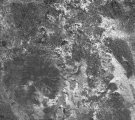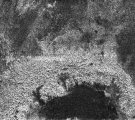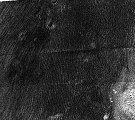Titan Flyby - 13 January 2007
11 January 2007
Sixteen days after its last flyby of Titan, Cassini returns for its twenty-fourth targeted encounter, Titan-23. The closest approach to Titan occurs on Saturday, 13 January, 08:38:31 UTC at an altitude of 1000 kilometres above the surface and at a speed of 6.0 kilometres per second. The latitude at closest approach is 31° N (over an area known as Aaru), and the encounter occurs on orbit number 37.This encounter is set up with two manoeuvres: an apoapsis manoeuvre on 5 January, and an approach manoeuvre, scheduled for 10 January. This inbound encounter occurs about 3 days before Saturn closest approach.
Science Activities
- Cassini Radar (RADAR)
The Titan-23 Synthetic Aperture RADAR (SAR) measurement clips Ganesa Macula, which is thought to be a cryovolcanic dome formed when ammonia and water seeped out onto the surface of Titan. (There may be some topographic constraints, certainly in the imaging of the northern, as-yet-unseen part of Ganesa). This flyby also overlaps with SAR measurements made during the Titan-A flyby (26.10.04) and altimetry measurements from Titan-A and Titan-3 (15.02.05). The end of the SAR swath is close to mountains seen by VIMS and the rim of a circular feature; Titan-23 also has the highest-latitude altimetry in the mission so far - Ultraviolet Imaging Spectrograph (UVIS)
UVIS will perform a far-ultraviolet observation, that will see the star Eta Ursa Major as it is occulted by Titan - Imaging Science Subsystem (ISS)
The ISS outbound and inbound observations will image the surface of Titan and attempt to track atmospheric and surface changes. ISS will also be looking at surface colour variations and monitoring limb hazes as well as particle properties, including vertical distributions with resolutions of ~6 km/pixel - Magnetospheric and Plasma Science (MAPS)
MAPS will perform an analysis of the plasma wake, ions escaping from Titan, and Titan's interaction with Saturn's magnetosphere down to a low altitude (1000 kilometres). INMS specifically will be looking at the atmospheric and ionospheric thermal structure of Titan's atmosphere - Magnetospheric Imaging Instrument (MIMI)
MIMI will investigate micro-scale and near aspects of the Titan interaction by observing during about one hour period around the Titan encounter. With the spacecraft -Y side pointed toward Titan, and within 30 minutes of the targeted flyby, MIMI will also measure Titan's exosphere/ magnetosphere interaction
Table of Events
31 December 2006
| Time UTC | Time wrt Titan-23 |
Activity |
| 23:58:00 | - 12d 09h | Ascending ring plane crossing |
5 January 2007
| Time UTC | Time wrt Titan-23 |
Activity |
| 13:50:00 | - 07d 19h | Start of sequence S27 which contains Titan-23 |
10 January 2007
| Time UTC | Time wrt Titan-23 |
Activity |
| 04:20:00 | - 03d 04h | OTM #88 prime. Titan-23 minus 4 day targeting manoeuvre |
11 January 2007
| Time UTC | Time wrt Titan-23 |
Activity |
| 04:21:00 | - 02d 04h | OTM #88 backup |
12 January 2007
| Time UTC | Time wrt Titan-23 |
Activity |
| 13:34:00 | - 19h 05m | Start of the TOST Segment |
| 13:34:00 | - 19h 05m | Turn cameras to Titan |
| 14:04:00 | - 18h 35m | Deadtime, 22 minutes long; used to accommodate changes in flyby time |
| 14:23:31 | - 18h 16m | Titan atmospheric observations. Obtain information on the thermal structure of Titan's stratosphere |
| 16:38:31 | - 16h 01m | Titan limb observations. Search Titans nightside for atmospheric lightning and auras |
| 17:38:31 | - 15h 01m | Titan atmospheric observations. Obtain information on the thermal structure of Titan's stratosphere |
| 19:38:31 | - 13h 01m | Titan atmospheric observations. Search Titans nightside exobase to dayside exobase. Also look for trace constituents in Titan's stratosphere |
13 January 2007
| Time UTC | Time wrt Titan-23 |
Activity |
| 03:38:31 | - 05h 01m | Radiometry measurements. Titan inbound RADAR radiometry observations. |
| 07:23:31 | - 01h 16m | Scatterometry measurements. Titan inbound RADAR scatterometry observations |
| 07:46:31 | - 00h 53m | Transition to thrusters. Thrusters are needed to compensate for Titan's atmosphere torque and target motion compensation |
| 08:08:31 | - 00h 31m | Titan inbound RADAR altimetry observations. Determine altitude of Titan's surface while pointing nadir |
| 08:23:31 | - 00h 16m | Low-res and hi-res Synthetic Aperture Radar (SAR) observations of Titan's surface. Determine Titan surface features. The T23 flyby includes a search for lakes on Titan at the high northern latitudes |
| 08:38:31 | + 00h 00m | Titan-23 flyby closest approach time. Altitude = 1000 km, speed = 6.0 kms-1, phase = lit outbound and 53° at closest approach, local Saturn time = 1.9 (near midnight), magnetospheric location = flank in, sub-spacecraft latitude & longitude = (31°, 358°) |
| 08:58:00 | + 00h 19m | Descending ring plane crossing |
| 08:45:31 | + 00h 06m | Titan outbound RADAR imaging. RADAR will obtain SAR images of Titan's surface |
| 08:53:31 | + 00h 14m | Titan outbound RADAR altimetry observations. Determine altitude of Titan's surface while spacecraft is pointing nadir |
| 09:08:31 | + 00h 29m | Scatterometry measurements. Titan outbound RADAR scatterometry observations |
| 09:42:31 | + 01h 03m | Transition to reaction wheels. Wheels are used for greater spacecraft stability |
| 10:19:31 | + 01h 40m | Radiometry measurements. Titan outbound RADAR radiometry observations |
| 13:38:31 | + 04h 59m | Titan surface observations. Full disk observations for surface and atmospheric mapping |
14 January 2007
| Time UTC | Time wrt Titan-23 |
Activity |
| 02:03:31 | + 17h 24m | Deadtime, 10 minutes long; used to accommodate changes in flyby time |
| 04:04:00 | + 19h 25m | Turn to Earth-line |
| 04:34:00 | + 19h 55m | Begin playback of T23 data. Madrid 34M handover to Goldstone 70M |
| 13:34:00 | + 01d 05h | End playback of T23 data |
16 January 2007
| Time UTC | Time wrt Titan-23 |
Activity |
| 13:00:00 | + 03d 04h | Saturn periapse, R = 12.5 Rs, latitude = -51°, phase = 39° |
Observation Results
Cassini Instrument: Synthetic Aperture Radar (SAR)
Last Update: 1 September 2019




